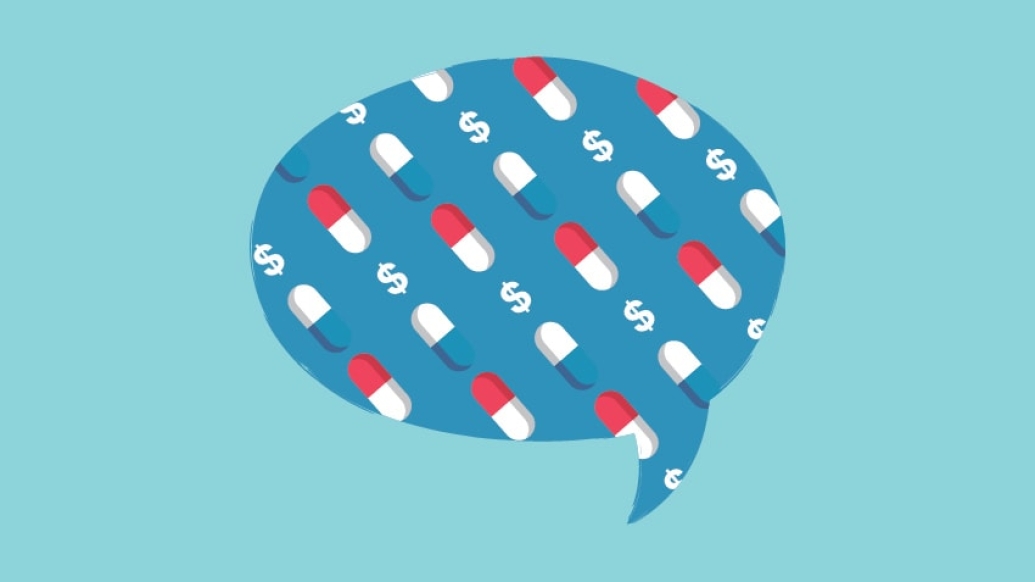If you feel hamstrung by the high price of medication, here’s what to tell your doctor and pharmacist, plus tips on how to cut out-of-pocket costs.
7:00 AM
Author |

Even if you have prescription drug coverage through a job, Medicare or Medicaid, the cost of medications can add up every month — especially if you take more than two.
MORE FROM MICHIGAN: Sign up for our weekly newsletter
But have you ever told your doctors how much you're paying out of pocket for their prescriptions? Or talked to your pharmacist about lower-cost options?
If not, you're not alone.
A new poll finds that while most Americans over age 50 take two or more prescription drugs, most haven't talked to their health providers about what the drugs cost them.
And 1 in 4 people over 50 say drug prices pose a burden to their finances. But only half of these most-affected people have spoken to a doctor about costs.
The findings surprised Preeti Malani, M.D., the University of Michigan doctor who heads the National Poll on Healthy Aging, which produced the findings with support from U-M and AARP.
"In many cases, patients assume that their doctors know how much their medications cost — but that's not always the case," says Malani. "Patients should ask about ways to reduce their costs, both during their doctor's visits and at the pharmacy. And clinicians should be more proactive in starting conversations with patients about costs and, when it's possible, to think about prescribing lower-cost alternatives."
But she takes some comfort in another key finding: Two-thirds of patients who did talk to their doctor about drug costs got a recommendation for a lower-cost alternative. One-third got help from a pharmacist.
In other words, it pays to speak up.
Malani, who is trained to handle the complex health needs of older people, says talking about the issue is just the start.
If you want to cut the amount of money you shell out each month for your prescriptions and other medicines, she says, here are some ways to do it:
How to save money on prescription drugs
-
Add up what your drugs cost you, including copayments and deductibles, and bring that list to your doctor's office and pharmacy. Don't assume they know.
-
Even if it's embarrassing, express how much of your monthly budget your drug costs eat up — and what you can't or don't buy because of them.
-
When you're dropping off or picking up a prescription, talk to the pharmacist about your costs and alternatives that might exist, such as generic versions or a form of the drug that gives the same dose if you take multiple pills or capsules, instead of a more convenient single-pill formulation.
-
Ask your pharmacist to ask your doctor's office to rewrite any of your prescriptions for a less-expensive option.
-
If you have multiple doctors, don't assume that they know what drugs others have prescribed for you. And don't expect that they'll feel comfortable changing the drug that another doctor prescribed so you can save money. But it can't hurt to ask what might be done.
-
If you have Medicare coverage, you're entitled to a formal medication review every year. That's an appointment with your doctor or a member of the clinic staff just about your medications. If you have private insurance, Medicaid or another plan, you might also have this benefit.
-
Talk to your doctor about whether it's time to stop any drugs that were prescribed a while ago. You might be able to stop taking a medication or lower your dose if you've recovered from an illness, if you've reduced a risk factor such as blood pressure or cholesterol through lifestyle changes, or if you're over age 70. Don't stop a medication without talking to a doctor first.
-
If you can't get cost relief on your medicines or there are no generic alternatives, you might be eligible for a discount from the drug manufacturer. The Partnership for Prescription Assistance, created by pharmaceutical companies, has a website where patients can see if they are eligible for an assistance program that could reduce costs.
-
For drugs that you'll be taking for a long time, look into mail-order and warehouse-club options, which can be less expensive.
How to cut over-the-counter drug costs
-
If you take a medication your doctor recommends that doesn't require a prescription (e.g., an allergy medicine that went from prescription to over-the-counter), insurance won't cover the cost. Buy the store brand, not the brand name, because by law they are identical. And look for coupons, sales and customer loyalty programs to further save.
-
If you have access to a flexible spending account at work, consider enrolling. You can use this money both for prescription drug copays and over-the-counter drugs that a physician prescribes.
What's not an option? Skipping doses or taking fewer pills than prescribed to save money, Malani says. Researchers call this "cost-related nonadherence" and have found that it can affect your health.
For sample questions to use when talking to your doctor or pharmacist about your drug, check out these tips from AARP. A full report of the poll findings is available at HealthyAgingPoll.org.

Explore a variety of healthcare news & stories by visiting the Health Lab home page for more articles.

Department of Communication at Michigan Medicine
Want top health & research news weekly? Sign up for Health Lab’s newsletters today!





